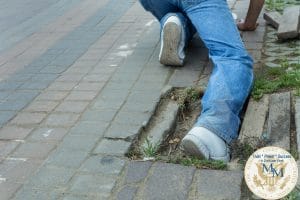Monetary Compensation for Sidewalk Accidents
The New York City Administrative Code (§7-211) requires property owners to purchase and maintain liability insurance to compensate accident victims for  personal injuries and property damage “proximately caused by the failure of such owner to maintain the sidewalk abutting such property in a reasonably safe condition.”
personal injuries and property damage “proximately caused by the failure of such owner to maintain the sidewalk abutting such property in a reasonably safe condition.”
The purpose behind this law is to ensure that accident victims who are injured by the negligence of a property owner or tenant have a financially responsible party from which to recover financial compensation for pain and suffering and any property damage sustained in a trip and fall or slip and fall on a city sidewalk.
This insurance requirement is especially important when the injury occurs in a location or under circumstances where the primary liability rests on the property owner, as opposed to the City. Although a monetary recovery cannot heal an injury, it can reimburse medical expenses, compensate for pain and suffering, and offset the loss of income resulting from missing work. Insurance is there to provide that monetary recovery.
What if there is no insurance?
The reality is that there are some property owners who fail to comply with the Administrative Code and do not purchase any liability insurance.
The Administrative Code specifically authorizes the City, in its discretion, to make payments for personal injuries sustained on properties that are uninsured. The injury victim must first obtain a judgment against the property owner, docket the judgment with the county clerk, and then file a petition with the City for compensation on the unsatisfied judgment.
The City is not required to pay any portion of the unsatisfied judgment, but it is permitted to, under certain conditions:
- “The amount of such payment shall not exceed uncompensated medical expenses”
- “No such payment or periodic payments shall exceed $50,000 in total”
- “Petitions for a payment . . . shall be presented to the comptroller not less than one or more than three years following entry of such judgment in the office of the county clerk”
- The “petition shall include evidence demonstrating (i) that efforts to collect the judgment have been pursued, and (ii) that the judgment debtor has no policy of liability insurance or other assets to satisfy the judgment”
- The injury victim must “execute an assignment of the judgment to the city”
Taken as a whole, the intent of this law appears to be to provide injury victims with a last-resort source of compensation where there are significant medical expenses and unsuccessful diligent efforts to collect compensation from the liable property owner.
If you are the victim of a sidewalk injury, you need an experienced team of attorneys to fight for the compensation that you deserve. Michael Manoussos & Co PLLC has successfully litigated cases like this for years and will fight for your rights.
Email Us For Your Free Case Evaluation






